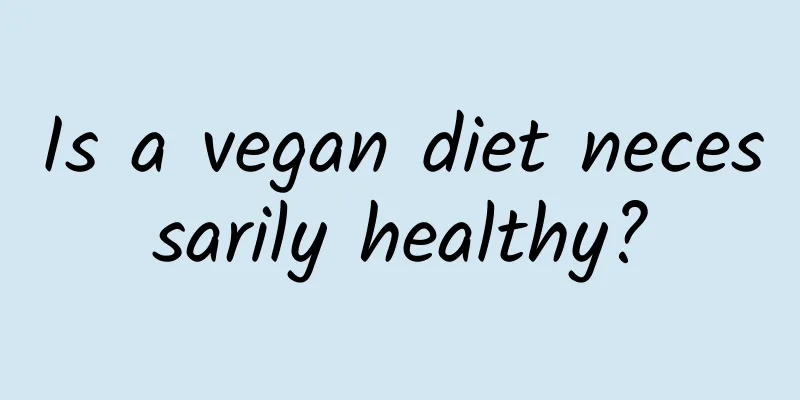Is a vegan diet necessarily healthy?

|
Author: He Xinhua, Chief Physician, Beijing Chaoyang Hospital, Capital Medical University Reviewer: Guo Shubin, Chief Physician, Beijing Chaoyang Hospital, Capital Medical University In the eyes of many elderly people, eating meat is unhealthy, and they think that their blood lipids are not well controlled because of eating meat. They simply equate eating meat with high blood lipids, which is actually unscientific. So is a vegan diet necessarily good? Copyright image, no permission to reprint 1. Vegetarianism is not necessarily healthier In many cardiovascular disease prevention and treatment guidelines at home and abroad, a low-salt, low-fat, high-calcium, high-quality protein and high-fiber diet is recommended as a healthy diet. Many studies have confirmed that compared with omnivores, lacto-vegetarians (milk + vegetarian) have significantly lower blood pressure, body mass index (an indicator of obesity), non-high-density lipoprotein cholesterol levels, fasting blood sugar and carotid intima-media thickness (an indicator of arteriosclerosis), and the risk of ischemic heart disease is reduced by about 32%, and the risk of cardiovascular disease in 5 to 10 years is significantly reduced. What is mentioned here is that partial vegetarianism reduces the risk of cardiovascular disease caused by metabolic syndrome risk factors such as obesity, but strict vegetarianism may have adverse effects on cardiovascular health. A domestic survey and analysis of the health status of a group of monks and nuns aged over 63 with a vegetarian history of more than 14 years showed that long-term overly strict vegetarianism and unbalanced diet can lead to endogenous lipid metabolism disorders. Although obesity may not be the cause, the incidence of cardiovascular disease has not been reduced. 2. Strict vegetarianism is harmful to the health of the elderly Vegetarians will feel very hungry due to lack of fat, and eating more oil-absorbing vegetables will increase their fat intake. Strict vegetarianism will also cause deficiencies in iron, zinc, calcium and fat-soluble vitamins in the body. The homocysteine level in the blood of such people will increase, which is an independent risk factor for atherosclerosis. In addition, strict vegetarianism will also cause anemia, hypoproteinemia, kidney stones, osteoporosis, low immunity, etc., which will endanger the health of the elderly. 3. A balanced diet is the best choice Copyright image, no permission to reprint For most elderly people, a balanced diet is the best choice. According to the dietary guidelines recommended by the Nutrition Society: a certain amount of meat, eggs, milk and sufficient fresh vegetables and fruits should be consumed every day; yellow-green and red vegetables and fruits should be emphasized, especially dark and green vegetables, which are rich in iron, calcium, folic acid, vitamin B, carotene, etc. |
<<: [National Cancer Prevention and Treatment Week] Breast nodules and breast hyperplasia
Recommend
Eating Mafulong has many benefits for the skin
In order to effectively prevent the occurrence of...
How to protect your uterus
The uterus is the most important reproductive org...
How long does it take to recover from postpartum hair loss?
The problem of postpartum hair loss is a normal p...
How to keep healthy while sleeping
Many friends may think that sleeping is a simple ...
Can I eat green garlic during menstruation?
During menstruation, you need to make reasonable ...
What are the tips for buying seaweed? Can eating seaweed lower blood sugar?
Nori is an ingredient used to make soup in our da...
Attention coffee lovers! Will drinking too much make you a "brittle bone person"?
Coffee is the source of energy for most people in...
Pain 3cm to the left of a woman's belly button
A little to the left of the navel is the duodenum...
What to do if you have stomach pain during pregnancy
If a woman develops some physical conditions duri...
Why are folic acid tablets given out for free when registering for marriage?
This is the 5082nd article of Da Yi Xiao Hu Recen...
Missed one day of birth control pills in 21 days
Generally speaking, many female friends are prone...
What are the three main functions of a computer network? What are the components of a computer file name?
A computer is a system that connects two or more ...
Can pregnant women eat saffron?
For women, many people choose to eat saffron to n...
What is the best medicine for uterine hypertrophy?
Uterine hypertrophy is a very common gynecologica...
How long will the contractions last after a cesarean section?
For pregnant women whose fetus is too large or wh...









